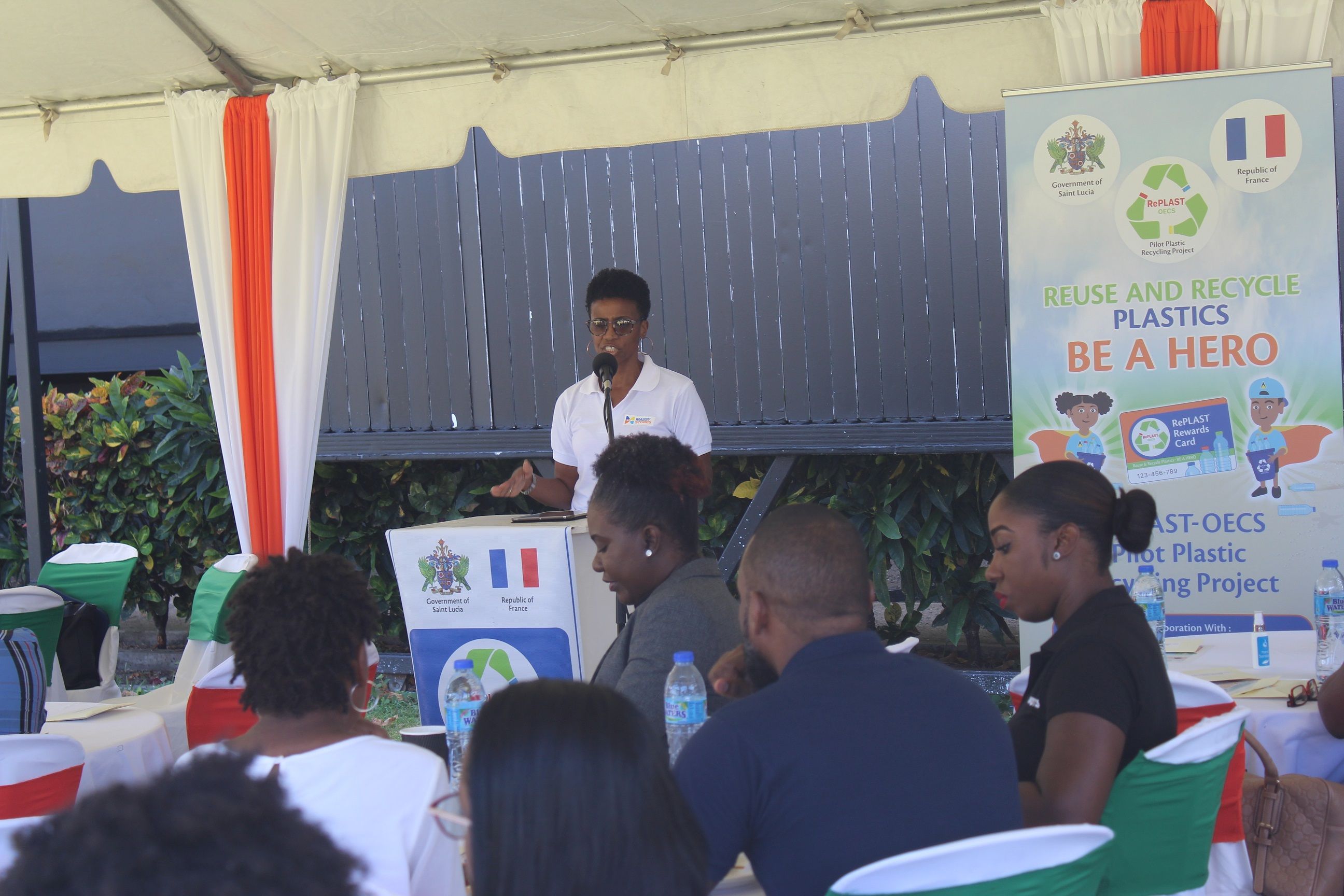Corporate Marketers Give RePLAST-OECS Initiative the Thumbs up
HRMs buy-in to policies promoting employee inclusion environmental advocacy
Close to 40 Senior Marketing and Human Resource Managers from the Services, Retail, Manufacturing and Construction sector concluded a breakfast conference with the RePLAST-OECS Pilot Plastic Recycling Project with high commendation for the proposed Incentivised Collection System which will support the collection and management of plastic waste in Saint Lucia. They also expressed renewed conviction about embracing policies and programs that directly support environmental sustainability.
The Breakfast event, sponsored in part by Landmark Events and hosted at the Daren Sammy Cricket Ground on September 25th, had the dual objective of providing marketing managers with an orientation of the Incentivised Collection System, and to make a case for Corporate Social Responsibility which empower both employees and consumers to be advocates for good environmental practices.
A cornerstone of the RePLAST Incentivised Collection System is a Rewards programme in which card holders receive reward points for collecting PET and HDPE plastic waste for recycling. Its success and sustainability is dependent on the participation of a range of business partners and retailers offering services and brands contributing to a monthly pool of rewards for redemption. Based on responses to date, the spectrum of Rewards Partners seems already set to include Health and Wellness, Petrol and Support Services, Culinary/ Fast Foods, Shipping and Supermarket Services.
On the HR and operational fronts, the executives also reviewed global and regional trends on how successful brands are aligning Corporate Social Responsibility (CSR) with the needs of the communities where they do business, and with national and global development priorities that invariably surround environmental sustainability. According to RePLAST-OECS Director Shanta King:
"the environment supports life, livelihoods and our aspirations for our country’s sustainable development and for business continuity at the market level. It was important that we attracted the attendance of the actual decisionmakers to demonstrate how aligning Corporate Social Responsibility (CSR) to support the outcomes of the RePLAST-OECS Project makes sense.”
Ms. King further explained that there is a direct correlation between the recycling of plastic waste and business continuity:
“Plastic pollution increases the impact of heavy rainfall on our country. Major flooding undermines infrastructure, affects public transportation; waterways clogged from plastic waste impact public health, which in turn has implications for productivity and business effectiveness”.
A highlight of the agenda was the presentation of a local case study featuring the leadership of Massy Stores in championing environmental responsibility through HR, operations and marketing policies. Massy Stores Divisional Manager- Marketing & Corporate Communications, Sariah Best Joseph presented the “The Massy Story” to much applause.
General Manager of Nagico St. Lucia Ltd, Ms. Adele Jn Baptiste described the breakfast forum as thought provoking and inspiring.
“I was blown away by the extent of work that has gone into establishing a sustainable collection system so far”, she said, noting that “forums such as this provide a depth of information that cannot be conveyed in a letter for sponsorship, but which is critical to be able to influence how companies prioritize their community programs.”
Project Director, Ms. Shanta King highlighted “the favorable level of response from the business community, the clear executive profile of those in attendance, and the quality of their feedback” as indicators of the event’s success. Comments from Mr. Omari Frederick, Senior Manager, Marketing and Corporate Communications at Bank of Saint Lucia support Ms. King’s assessment:
“I am very impressed with the work of implementing agency Unite Caribbean and the RePLAST-OECS Project”, he said, adding that “In the past one would say that the environment is a subset of the economy. That is a fallacy. The economy is a subset of the environment. We have an obligation as a people, as responsible social entities and companies, to take care of our environment, and we look forward to the many possibilities of partnering in this regard”.
About RePLAST-OECS Pilot Plastic Recycling Project
The RePLAST‒OECS Pilot Plastic Recycling Project launched in May 2019, is a two-year public-private initiative, being implemented by UNITE Caribbean and is aimed at setting-up an incentivised plastic waste collection and recycling scheme. The plastic collected will be exported to a recycling plant in the Caribbean promoting a circular economy model. The first pilot country is Saint Lucia with subsequent replication in the OECS countries.
To date, the RePLAST‒OECS Project has facilitated an experimental shipment working with local recyclers. This included two 40- foot containers of baled PET bottles of approximately 26,000 pounds (lbs). - This exported plastic waste would normally be disposed of and as a result, has increased the life of the Landfill.
About Unite Caribbean
UNITE Caribbean is a Caribbean cooperation and development consulting firm, supporting the social and economic development of Caribbean territories through regional technical cooperation. Unite Caribbean consults on behalf of governments and the private sector on projects of paramount importance to Caribbean in a range of disciplines including Public Governance, Climate Change, Environment, Education, Sport, Economic Development, and Public health.









